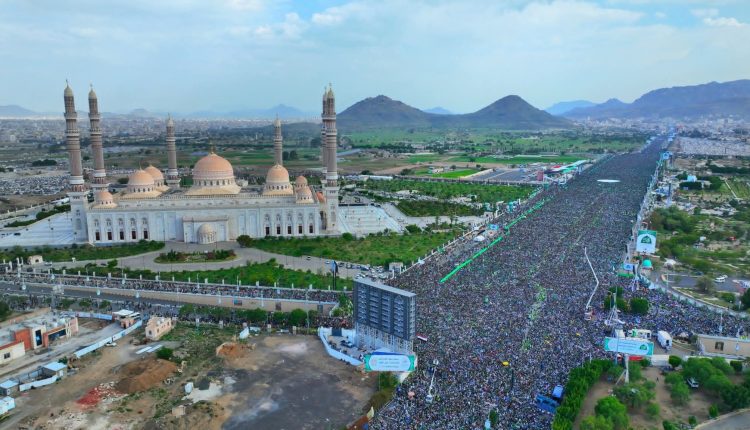OCCUPIED JAFFA, Sept. 08 (YPA) – The Yemeni capital of Sanaa and other provinces witnessed massive and historic celebrations on the 12th of Rabi’ al-Awwal to mark the Prophet’s birthday.
Millions of people flocked to Al-Sabeen Square in the capital and other plazas, creating a “Muhammadan” tableau. This affirmed their commitment to following the Prophet’s path, supporting the oppressed, and emulating his Quranic ethics, which led humanity from darkness into light.
This majestic gathering embodied the deep connection between the Yemeni people and the Prophet Muhammad (peace be upon him), the Messenger of the nation and humanity. It captured the attention of the world, especially the Israeli entity, which is already intimidated by Sanaa’s pro-Gaza solidarity rallies every Friday.
The celebration of the Prophet’s birthday in Yemen, particularly by Ansarallah, has various effects on the Zionist entity that go beyond the religious aspect to include political, strategic, and security dimensions.
The message of the Prophet’s birthday celebration to “Israel” is that the conflict is not only political but also religious and existential. This is a source of great concern for the Israeli occupation, which monitors these crowds despite its airstrikes on Sanaa. The strikes’ effect is minimal against these throngs; in fact, they only increase Yemenis’ resolve to stand with Palestine and renew their allegiance to its cause.
Furthermore, the widespread popular support, which is expressed in pro-Palestine statements, plays a role in the continued targeting of the Israeli occupation’s military deep within the occupied territory and at sea. This creates a strategic weight for Yemen, psychologically compounding the occupation’s suffering in the face of such steadfastness and unity of position.
Hebrew Concern Over the Prophet’s Birthday
The Israeli occupation pays close attention to religious celebrations in Yemen, especially the Prophet’s birthday. This is evident in the Israeli media’s coverage of the event.
Newspapers such as “Yedioth Ahronoth” and “the Jerusalem Post,” and channels like Kan and 24, focused on the celebration and highlighted the massive crowds and popular participation.
The Israeli media’s monitoring of the Prophet’s birthday celebrations is part of a broader security strategy to monitor the strength of the adversary and understand the foundations of the conflict in the region.
Israeli media outlets considered the Prophet’s birthday celebration squares to be platforms of hostility toward Zionists. “Haaretz” focused on a statement by a participating cleric who said, “Yemen is more prepared than any other country to return Islam to its roots thanks to its Quranic school.”
“Maariv” focused on the huge public turnout in Sanaa, considering the celebration a reflection of Ansarallah’s power to mobilize. It pointed out that the speeches included attacks on “Israel” and the United States and described the occasion as a “political show of force” rather than a religious event.
For its part, Yedioth Ahronoth linked the celebrations to regional tensions, noting that Ansarallah exploited the occasion to showcase their military and political capabilities, with references to chants against “Israel” and calls to support the resistance in Gaza.
In summary, the Israeli media described the Prophet’s birthday celebration as a “remarkable display that reflects strength and continuity” in the context of the open confrontation with the occupation.
It noted that Yemenis celebrated the occasion in an unprecedented and majestic manner, with green flags and plazas filled with crowds, considering these images to carry “mobilization dimensions and direct political messages” to both domestic and foreign audiences.
According to Israeli media, the events accompanying the occasion confirmed that Yemenis have transformed the Prophet’s birthday from a religious celebration into an occasion for popular mobilization and a message of defiance, at a time when the Yemeni armed forces are continuing their missile and drone strikes against the Israeli occupation in support of Gaza.
The Israeli media confirmed that these events highlighted the “cohesion and steadfastness of the Yemeni position,” despite attempts at escalation and pressure.
The most prominent Israeli fear stemming from Sanaa’s celebration of the Prophet’s birthday is its concern about the celebration’s impact on normalization projects with some Arab countries.
YPA®


